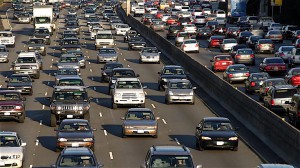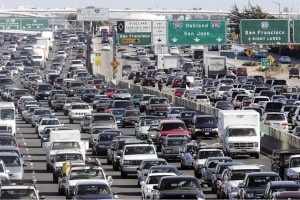Americans are driving more and more each year and many of those billions of miles traveled come as part of the daily commute to and from work, and new research reveals that comes at a higher price than some might expect.
An average person in the U.S. spends nearly $1,250 annually on fuel and maintenance related to the aforementioned daily trek for work. However, that figure rises significantly when you add the time lost making that drive every day — it jumps to $6,449 each year, according to Clever, a real estate and investing website.
Most motorists don’t consider time as part of the equation when sorting out how much it costs to get to their job; however, there is one and it’s called opportunity cost. This is time that could be spent working, reading, playing with your kids, lounging by the pool, etc. The website computes by taking the average U.S. hourly wage and dividing by the amount of time spent commuting.
(U.S. new vehicle sales rise in November)
The average American spends 46 minutes behind the wheel commuting round trip, which is more than 200 hours annually. The opportunity cost adds $5,200 to that daily commute, and accounts for $12.9 billion of the $16 billion attributed to driving back and forth to one’s place of employment annually.
This means that just $3.1 billion is spent on the actual vehicle. According to AAA, the typical cost of vehicle maintenance is 8.94 cents per mile. Driving to and from work is about 25% of a vehicle’s total miles, commuting adds up over time.
The average American travels nearly 23 miles each day getting to and from work, which costs about $2 in maintenance and $1.39 in fuel. That calculates to 5,907 miles and $1,249 in maintenance and gasoline costs just to cover commuting.
(Drivers warming to idea of self-driving technology, study says)
However, the daily commute takes its toll in other ways. Think about how you feel after spending some quality time with what seems like everyone else on the planet who clearly decided to leave at the same time you did. Some studies have shown the stress levels commuters face during rush hour are similar to those that fighter pilots experience.
People with longer commutes are less healthy, experience more stress and depression, take more days off work, and are less productive than those who have shorter commutes, Clever reported.
Long commutes contribute to increased stress because of the unpredictability of traffic and driving conditions, which bleeds into people’s overall satisfaction with their jobs and leisure activities. A 20-minute increase in commute time has the same impact on people’s job satisfaction as a 19% pay cut, the website noted.
(“Consumers Do Not Want to Buy or Drive” EVs? Not so in Europe)
So what to do? Well, experts polled suggest trying to change the time of your commute to a less traffic-filled time of day. Additionally, if working from home – even just a few days a week – is possible that will make a significant impact.



I have always considered time spent commuting as uncompensated time spent at work (it is time spent for work in any case), and factored that in when considering any job and its compensation.